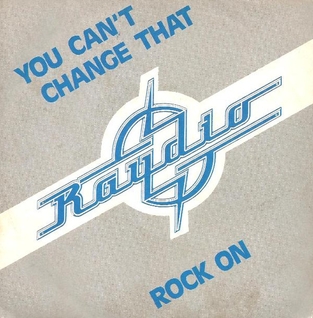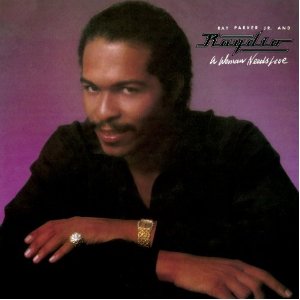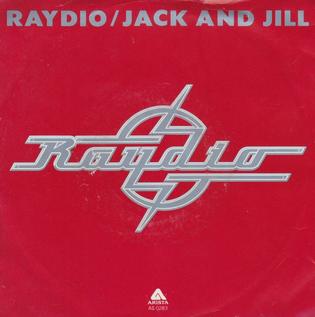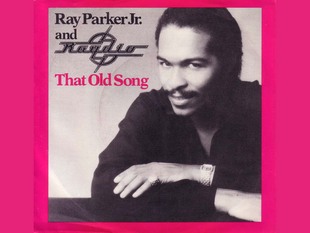
"Crazy Little Thing Called Love" is a song by the British rock band Queen. Written by Freddie Mercury in 1979, the track is included on their 1980 album The Game, and also appears on the band's compilation album Greatest Hits in 1981. The song peaked at number two in the UK Singles Chart in 1979, becoming the group's first number-one single on the Billboard Hot 100 in the US in 1980, remaining there for four consecutive weeks. It topped the Australian ARIA Charts for seven weeks. It was the band's final single release of the 1970s.

Ray Erskine Parker Jr. is an American musician, singer, songwriter, and record producer. As a solo performer, he wrote and performed the theme song for the 1984 film Ghostbusters. Previously, Parker achieved a US top-5 hit in 1982 with "The Other Woman". He also performed with his band, Raydio, and with Barry White in the Love Unlimited Orchestra.
Jerry Ernest Knight was an American R&B vocalist and bassist who reached prominence in the late 1970s and early 1980s, during which he was part of several groups and had a brief solo career.
Raydio is an American funk and R&B vocal group formed in 1977 by Ray Parker Jr., with Vincent Bonham, Jerry Knight, and Arnell Carmichael. In 1978 Charles Julian Fearing and Larry “Fatback” Tolbert joined the band, along with Darren Carmichael.

"When a Man Loves a Woman" is a song written by Calvin Lewis and Andrew Wright and first recorded by Percy Sledge in 1966 at Norala Sound Studio in Sheffield, Alabama. It made number one on both the Billboard Hot 100 and R&B singles charts. Country singer John Wesley Ryles had a minor hit with his version of the song in 1976 while singer and actress Bette Midler recorded the song 14 years later and had a Top 40 hit with her version in 1990. In 1991, Michael Bolton recorded the song and his version peaked at number one on both the Billboard Hot 100 chart and the Billboard Adult Contemporary Singles chart.

"Ghostbusters" is a song written by American musician Ray Parker Jr. as the theme to the 1984 film Ghostbusters, and included on its soundtrack. Debuting at number 68 on June 16, 1984, the song peaked at No. 1 on the Billboard Hot 100 on August 11, staying there for three weeks, and at No. 2 on the UK Singles Chart on September 16, staying there for three weeks. The song reentered the UK Top 75 on November 2, 2008 at No. 49 and again on November 5, 2021, at No. 38.

"Baby, Come to Me", a love ballad from Patti Austin's 1981 album Every Home Should Have One, was her duet with James Ingram. It was written by Rod Temperton. The song was released as a single in April 1982, initially peaking at No. 73 on the US Billboard Hot 100. Several months later, American soap opera General Hospital began to feature the song heavily as the love theme for character Luke Spencer. It was re-released in October of that same year and reached No. 1 on the US chart in February 1983.

"Woman in Love" is a song performed by Barbra Streisand and taken from her 1980 album Guilty. The song was written by Barry and Robin Gibb of the Bee Gees, who received the 1980 Ivor Novello award for Best Song Musically and Lyrically. It is her fourth of four Platinum records, and is considered her greatest international hit.

"Waiting for a Girl Like You" is a 1981 power ballad by the British-American rock band Foreigner released as the second single from the album 4 (1981) and was co-written by Lou Gramm and Mick Jones. The opening motif was written by Ian McDonald and the distinctive synthesizer theme was performed by the then-little-known Thomas Dolby.

"You Make Me Feel Like Dancing" is a song credited to British singer Leo Sayer, taken from his 1976 album Endless Flight.

"I'm Gonna Love You Just a Little More Baby" is a song written, produced and recorded by Barry White.

"You Can't Change That" is a song by Raydio from their second studio album Rock On. Released as a single in 1979, it reached #9 on the US Billboard Hot 100 chart and #3 on the soul chart.

Raydio is the debut album by the band Raydio in 1978 on Arista Records. The album peaked at No. 8 on the Billboard Top Soul LPs chart and No. 27 on the Billboard 200 chart. Raydio was certified Gold in the US by the RIAA.

Rock On is the second album by Raydio, released in 1979 on Arista Records. The album reached No. 4 on the US Billboard Top Soul Albums chart and No. 45 on the US Billboard 200 chart. Rock On was also certified Gold in the US by the RIAA.

Two Places at the Same Time is the third studio album by Raydio, the group led by Ray Parker Jr.

A Woman Needs Love is a 1981 album by American band Raydio, led by guitarist singer/songwriter Ray Parker Jr. Released by Arista Records on April 11, 1981, this is the fourth and final album by the band.

Ollie E. Brown is an American drummer, percussionist, record producer, and high-school basketball coach. A prolific session musician, Brown has performed on over a hundred albums in the 1970s, 1980s and 1990s. Brown was also half of the American dance-pop duo Ollie & Jerry, which had a Top 10 hit with "Breakin'... There's No Stopping Us" in 1984.

"The Other Woman" is the title track from the album The Other Woman by Ray Parker Jr. It was his first solo hit single without his longtime group, Raydio. Released as a single in March 1982, it peaked at number four on the Billboard Hot 100, number two on the Hot Black Singles chart, number twenty-four on the dance chart, and number thirty-three on the Adult Contemporary chart. It also spent one week at number one in Australia.

"Jack and Jill" is a 1977 hit song by R&B vocal group Raydio. It was the first single from their debut album Raydio, and became an international top 10 hit. It reached number eight on the U.S. Billboard Hot 100 and number six on the Cashbox Top 100. It reached number five in Canada, number four in Australia, and the top twenty in UK. It was the first of five U.S. top 10 singles by Ray Parker Jr. and/or Raydio.

"That Old Song" is a 1981 song recorded by American R&B vocalist and songwriter Ray Parker Jr., along with his group, Raydio. It was the third of four single releases from their 1981 album, A Woman Needs Love, the last Parker recorded with Raydio. It was the second biggest hit from the album, after "A Woman Needs Love ."


















